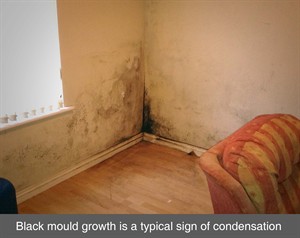Condensation
Condensation Control
Most of us will identify condensation as the steaming up of
mirrors after a shower, or water vapour on our windows on a cold
day. However, condensation can be much more problematic than
this, eventually creating a damp black mould on walls; usually at
high level, and on external walls (which tend to be colder than
internal walls). Often, people confuse condensation for damp
(rising
damp or penetrating damp).
Causes of Condensation

Persistent condensation, which causes black mould growth, is
generally caused by inadequate heat or poor ventilation, and can
cause health problems, especially for those with respiratory
illnesses like asthma.
- Condensation typically happens only in the colder months of the
year, though the black mould once formed will not disappear unless
cleaned, and is likely to reappear unless the core problem is
rectified.
- Water vapour and damp normally forms on the colder surfaces
like, windows, mirrors, external walls (particularly corners),
wall-to-floor junctions.
- Condensation happens most often in areas where lots of moisture
is produced, eg kitchens and bathrooms, and also unheated rooms
into which moisture can drift (normally bedrooms where the heat
isn't on as much).
- Often condensation is worse in areas where air movement is
restricted, eg behind furniture or inside cupboards on outside
walls.
- Condensation is a common problem where flueless paraffin or
butane heaters or unvented tumble driers are used, and/or where
clothes are dried indoors.
Treatment of Condensation
Condensation is caused by excessive moisture, inadequate
ventilation and/or heat. Water vapour is held in hot air, but
once the air starts to cool, or meets a cold surface (eg an
outside, unisulated wall), the vapour will condense on a cold
surface, causing moisture or damp. The remedy for this is
to increase ventilation levels, circulate the air, and
increase heat within the house, by using a Positive
Air Ventilation unit.